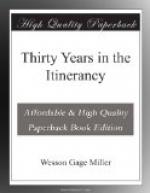Watertown, at the time of my appointment, had been a separate charge one year. A Church edifice had been commenced, and a class formed. The members were Mr. and Mrs. Walter Andrews, Mr., and Mrs. Heber Smith, Mr. and Mrs. Calvin Bunton, Mr. and Mrs. Wm. A. Dutcher, Mr. and Mrs. Elihu Higgins, Mr. and Mrs. Albert Cook, Mrs. Simeon Ford, Mr. and Mrs. Cheney Adams, Mr. Sands Cook, and others.
The financial ability of the charge was moderate, and hence the erection of the Church required a great effort. Our meetings were held in the school house until the Church edifice was enclosed, plastered, and furnished with temporary seats.
The fall of 1846 was a season of unusual sickness, fevers in various forms being the principal ailment. Along the valley of the Rock River, the affliction became so flagrant that scarcely a family escaped. And in some families, so universal were its ravages, that not one member was left in condition to care for the balance. In this state of things hundreds suffered, and not a few even died for want of kindly attention.
Repeatedly, when riding through the country to visit the sick and bury the dead, I found flags of distress hung out over the dwellings of sick families, where not one was able to bring a pail of water, or provide a morsel of food. In such cases I installed myself master of ceremonies, kindled fires, brought water, administered medicines, and then went forward to render the same class of services to others.
In attending funerals in the surrounding neighborhoods, I sometimes found there were not well people enough to bury their dead. After performing the sacred functions of my office as a minister, I was obliged to aid, with my own hands, to let the coffin down to its final resting place.
Though still frail from my illness during the previous year, I stood this strain for two months, when I was prostrated by an attack of bilious fever. During the first week of my illness a physician made two visits to my boarding place, and this was more than he could give to the greater portion of his patients. The family with whom I boarded were all sick, and I was dependent for care mostly upon such snatches of service as others could spare from pressing demands at home. At the end of a week, believing my chances of recovery, under such circumstances, precarious, I ordered my horse and buggy, and started for Waupun, thirty miles distant. My friends remonstrated, and thought me insane; but, fortunately, they were too ill to prevent the movement. The attempt was perilous, indeed, but by the aid of stimulants, which I had provided with special care, and a will-power that nerved itself for the occasion, I made the passage safely. At the end of four hours I was comfortably housed at the residence of Dr. Bowman, who bestowed upon me skillful medical treatment, while his family gave me careful and faithful nursing.
At the end of four weeks I was able to return to my post of duty. The sickness had now mostly passed, and I was able to enter more fully upon the regular labors of the charge. I now adopted a plan of systematic labor, giving the forenoons to my study and the afternoons to pastoral visiting. And I soon found that earnest and devoted labor brought its reward. A revival speedily followed, which added a goodly number of probationers.




